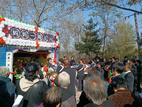Pastor D has served in an urban church in eastern China for 21 years. When the church started with only five members, she played other pastors' sermons on CDs for them as she had no idea how to deliver sermons.
In her serving journey, the words “God is pleading with the willing heart, for the gift is accepted based on what one has, not one does not have” continually comfort her. That is also the message she tries to give her congregation in her recent sermon.
Reflecting on the parable of the bags of gold and the parable of the ten minas, pastor D noted that we received the same gift and different gifts.
In the first parable, each servant was entrusted with a different amount—five, two, and one bag of gold—based on their abilities. Pastor D explained that everyone has unique gifts, and it’s unnecessary to envy others' paths.
The servant with two bags isn’t accountable for a gain of five bags, and the one with five bags won’t be praised if he only gains two. What matters, she highlighted, is that each person does their best with what they have, as the master values faithfulness, not the amount of gold earned.
Prior to the parable of minas recorded the stories of blind Bartimaeus and the tax collector Zacchaeus, both of whom received Jesus' salvation and answered His call, which resonate with the message of the parable--every servant was entrusted one mina, and we all received the same salvation from Jesus, regardless our background.
In both parables, those who earned more were praised by the master, while those who buried the gift were condemned.
"Each of us has received an investment from the kingdom of heaven," pastor D said. "We received the same salvation and the different gifts. The standard of the kingdom of heaven is based on how we respond to the opportunities God has entrusted to us."
These opportunities could be our lives, talents, work, wealth, or chances to share the gospel. "Whether big or small of the opportunities, the essence is how we use these opportunities to fulfill God’s will," she continued.
Pastor D shared a vision, illustrating the difference between heaven’s and human’s standards. In the vision, God asked a prophet who pleased Him more: a preacher delivering a sermon or a homeless man trying to refrain from kicking away a cat rubbing against him. God’s answer was the homeless man.
The two individuals came from different backgrounds. The preacher was raised in a devoted family, received a good education, and experienced abundant love. In contrast, the homeless man endured hardship since childhood and received little love.
The preacher gave out a part of what he received, while the homeless man used all he had to resist his anger. So God gave the latter one more ability to love. Ultimately, he ended his life for the sake of the gospel and is sitting in the king’s seat now.
Pastor D encouraged her congregations that, regardless of their abilities, each person could serve as a vessel for God. She shared examples of a Christian man who repaired the church’s network equipment, saving tens of thousands, and a Christian woman working as a janitor who prayed for a boy in urgent need of surgery and recovered safely.
Those who do modest, unnoticed work and are faithful in their quiet dedication will receive the Lord’s praise, pastor D commented.
She concluded by urging believers to pray for pastors and leaders, as they are entrusted with more souls and bear greater responsibilities.
"The earth is a preview of heaven, and our life here is a glimpse of eternal life. How will you live your life? According to what you have."
- Edited by Karen Luo, translated by Poppy Chan












